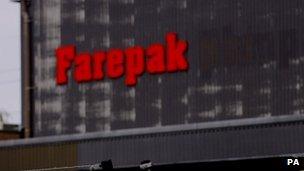Farepak collapse: Judge partly blames HBOS bank
- Published

There was no justified complaint against the Farepak directors, the judge said
A High Court judge has partly blamed the "hardball" attitude of the HBOS banking group for the collapse of the Farepak Christmas savings firm in 2006.
Mr Justice Smith exonerated the company directors of any blame, after the government dropped legal proceedings to have them disqualified as directors.
In a highly unusual move, the judge called on the bank to return up to £10m more to the customers who lost savings.
HBOS said its employees had acted "entirely appropriately".
Swindon-based Farepak collapsed in 2006, leaving 116,000 customers with losses of £37m.
"This is not a court of morality, but I would suggest that HBOS really ought to look at the collections that they took in September and October [2006] and seriously consider whether or not they ought to make a further substantial payment to the compensation fund," <link> <caption>said Mr Justice Smith in a public statement</caption> <url href="http://www.judiciary.gov.uk/Resources/JCO/Documents/Judgments/farepak-judges-statement.pdf" platform="highweb"/> </link> after the case was dropped.
"It seems to me that what happened there, whilst apparently legally acceptable, might not be regarded in the public's eyes as being acceptable."
HBOS said it would consider making a further voluntary contribution to the Farepak compensation fund.
"We contributed £2m after Farepak collapsed and we will consider the comments that the judge made today," the bank said.
'Strenuous efforts'
The government's Insolvency Service had argued that the high-profile collapse of Farepak had been the fault of nine former directors of the company.
But at the High Court on Wednesday the service had to admit that its case did not stand up, and the action was dropped.
Mr Justice Smith then decided that the aggrieved Farepak customers had not received the explanation they deserved for their losses.
The directors had been accused of continuing to accept the customers payments during the course of 2006 as the company headed for insolvency, knowing that they would probably lose their money anyway when the company finally went bust.
However the judge said that all the witnesses to the case had made no criticism of the directors, and in fact their attempt to keep going while looking for a solvent solution for the company had been reasonable.
"If they want to try and save the company in a non-insolvent way the only way to do that is to continue trading, if they do not continue trading the group collapses," the judge said.
"Not only did the directors do nothing wrong, but they made genuine strenuous efforts to save the group and the depositors.
"They did everything, as far as I can see, possible to save the group," he added.
'Flinty ground'
The judge explained that Farepak went bust when its parent company EHR, which held Farepak's money and the cash it collected from customers, became insolvent.
But Mr Justice Smith severely criticised the role of the firm's bankers, HBOS, while the directors were struggling to keep the firm afloat.
"They in effect forced the directors to carry on in September and October collecting deposits, that at a time when they believed there would be an insolvent solution," he said.
An extra £10m came in from customers, £4m of which went into Farepak's bank account and £6m of which was used to keep on trading, which would be to the benefit of HBOS when the firm was eventually sold after going bust.
"HBOS knew that those deposits would be paid and would be lost if their expected solution went out and that the only beneficiary of those deposits would be HBOS," the judge added.
An extension of Farepak's overdraft by £3 to £5m from HBOS might have kept Farepak going, the judge said, but the bank was not prepared to do this.
The directors efforts "failed over the period between March and October 2006 on the flinty ground of HBOS, which had a policy of playing hardball, of which it appeared to be proud, and conceding nothing," he said.
That was because HBOS had its overdraft of £40m to the company secured so it would be fully repaid in the event the firm went bust.
Mr Justice Smith ended by stating that if the government had taken the same hard nosed attitude to HBOS when the bank had to be rescued two years later in the depths of the banking crisis, the bank would not have survived.
- Published22 January 2012